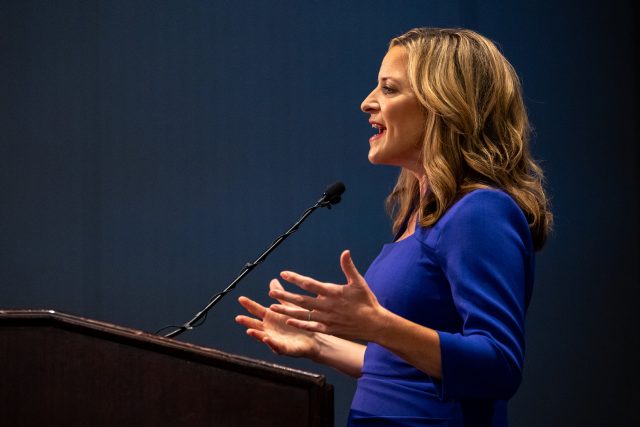[ad_1]
Editor’s Note: Alec Hughes is a former Daily staffer. Hughes did not contribute to the reporting of this article.
The Michigan Supreme Court ruled in favor of election challengers guidance issued by Secretary of State Jocelyn Benson (D) in late August. Election challengers, or poll watchers, are authorized by the state to observe election procedures at polling locations and verify voter eligibility and absentee ballots. In a 4-3 decision, the court upheld most of the guidance developed by Benson, concluding that she could control instructions for election challengers without going through a more extensive rule-making process ahead of the Nov. 5 presidential and Congressional elections.
The instruction manual included a new credential form for poll watchers, limits on when challenges could be recorded and a strict ban on the possession of electronic devices in closed-door absentee voting counting rooms while polling precincts are open.
The case originated from a June lawsuit brought forth by election challengers and Republican parties concerned with Benson’s instructions for poll watchers. The plaintiffs claimed that Benson’s instructions for election workers disregarded the state’s rule-making process and conflicted with election laws and constitutional provisions.
In 2020, 39 U.S. states, including Michigan, modified administrative or statutory election procedures before the general election in November. Litigation followed the modifications to election processes, with more than 425 lawsuits and subsequent appeals filed nationwide.
In the court’s decision, Justice Kyra Harris Bolden wrote that Benson’s job requires oversight and management of the actions of local officials as they carry out election protocols.
“Under the Michigan Election Law, the secretary of state is the chief election officer of Michigan,” Bolden wrote. “The secretary has supervisory control over local election officials in the performance of their duties.”
In a statement, Benson wrote that while election challengers have the right to observe the process, it is the duty of officials to ensure polling places are orderly and protect voters from disruptions.
“As our guidance has consistently made clear, challengers have a right to participate in the election process and they play an important role,” Benson wrote. “But election officials have a responsibility to maintain order in the polling place and ensure voters can cast a ballot without interference.”
Benson also wrote that the clarity in her rules would streamline the election process and affirm the state’s commitment to conducting secure and fair elections.
“This clarity will help election officials, poll workers, challengers, and voters alike as we prepare for the November General Election and beyond,” Benson wrote. “As always, we are committed to following the law as we administer accessible, secure, and transparent elections for Michigan citizens.”
This specific case is not the first time Benson’s guidance has faced legal challenges. On March 9, 2021, the State Court of Claims ruled that Benson’s guidance issued to Michigan clerks instructing them to verify absentee ballot signatures was invalid.
State law instructs election clerks to verify that signatures on absentee ballot requests correspond to the voter’s signature, ensuring the ballot is being submitted by the correct registered Michigan voter. That same month, Allegan County Clerk Robert Genetski and the Michigan Republican Party filed a lawsuit stating that Benson’s rules violated the Administrative Procedures Act, which requires that certain state policies undergo a formal rule-making process. They argued that Benson’s guidance posed significant changes to the election process and it should therefore have gone through the more rigorous APA inspection.
In 2021, Judge Christopher Murray told the Associated Press that decisions favoring the validity of signatures should be made through formal rules set by the state legislature or remain under enforceable constitutional acts.
“Nowhere in this state’s election law has the Legislature indicated that signatures are to be presumed valid, nor did the Legislature require that signatures are to be accepted so long as there are any redeeming qualities in the application or return envelope signature as compared with the signature on file,” Murray said.
In 2020, Benson’s initiative to send absentee ballot applications without prior requests to all registered voters in Michigan faced legal challenges, but was ultimately affirmed by the Court of Claims and the Court of Appeals.
In an interview with The Michigan Daily, LSA senior Alec Hughes, co-chair of the U-M chapter of College Democrats, said he believes there is a need for public oversight of elections to ensure a fair democracy.
“We want to make sure that election inspectors aren’t feeling like they (are being) intimidated,” Hugh said. “There needs to be transparency from the public, because that’s the only way that we can ensure we are (a) free and fair democracy. But also, we can’t have too many election challenges, like filing arbitrary or frivolous challenges that are meant to just drag out the process.”
Daily Staff Reporter Andrew Baum can be reached at asbaum@umich.edu.
Related articles
[ad_2]
Source link











